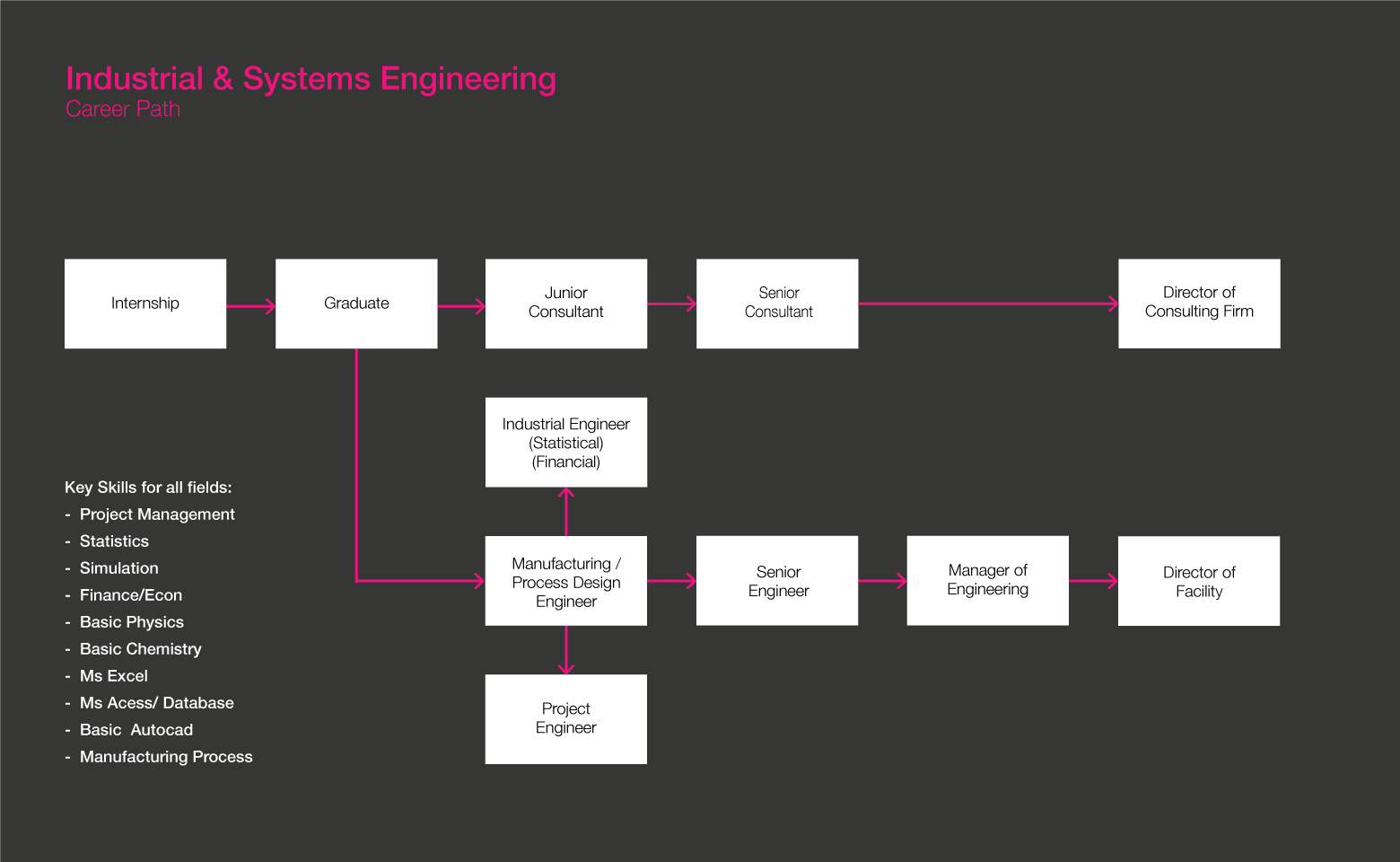Focos
Títulos similares
Management Analysts, Logisticians, Continuous Improvement Engineer, Engineer, Facilities Engineer, Industrial Engineer, Operations Engineer, Plant Engineer, Process Engineer, Project Engineer, Quality Engineer, Research and Development Engineer (R and D Engineer)
Descripción del puesto
Industrial engineers research, design, and implement systems to maximize the efficiency of production processes. Their work involves minimizing wastefulness through precise coordination of time, workers, machinery, materials, workers’ safety, environmental concerns, and cost.
Aspectos gratificantes de la carrera profesional
- Job satisfaction: watching your design being used to successfully improve the efficiency of your company
- Pay: a good solid salary
- Intellectually challenging: making use of the technical and life skills acquired in university
- Job security: the function of industrial engineers is quite in-demand
$84,310
La primicia
Un día en la vida
- There IS no typical day for an engineer. There is always going to be something breaking, going wrong, ordered wrong, or refusing to fit. In all other careers, problems are obstacles to the job - but in engineering, problems ARE the job!
- Mornings may start off with personal time to respond to emails and conduct some project management. Organization and communication is critical in this field because much of the work is done in teams.
- The rest of the day may be spent collaborating on various assigned projects.
- Most of this work is done on a computer (using Excel for data analysis, Autocad for drawings, Access for database updating, etc),
- A third of the work day is spent out on the factory floor. Wearing jeans, steel-toed boots, and safety goggles, industrial engineers blend in with the machines as they study them and try to find solutions to either fix or improve them.
- Being flexible to colleagues’ work dynamics is important, as industrial engineers may be working with hundreds of other employees, both domestically and internationally
- An Industrial Engineer consultant has similar job responsibilities, except their duties require extra precaution in terms of organization and communication since they get the opportunity to work with different companies
Habilidades necesarias
Habilidades sociales
- Creatividad
- Comunicación
- Resolución de problemas
Competencias técnicas
- Math: calculus, trigonometry, etc.
- Analytical or scientific software: Dataxiom StatMost; Windward Technologies GRG2; Wolfram Research Mathematica; Workcell simulation software
- Computer aided design CAD software: Autodesk AutoCAD, Dassault Systemes CATIA, International TechneGroup IGESworks, PTC Creo Parametric
- Industrial control software: Allen Bradley PanelView, Computer numerical control CNC software, Human machine interface HMI software, Nupro CastView
Diferentes tipos de organizaciones
- Consulting firm
- Manufacturing industry
Expectativas/Sacrificios necesarios
- Challenging workload in university: industrial engineering programs require 4 years of intense effort, organization, and discipline
- May have to start as an intern or in a lower paying entry-level position: even still, starting pay is usually quite competitive and there is good potential for salary increase in this field
Tendencias actuales del sector
- The good news is virtually all production industries have use of an industrial engineer
- The current “buzz-field” is software and computers. Knowledge of computers and programmes, especially Excel, is very desirable
¿Qué tipo de cosas le gustaba hacer a la gente de esta carrera cuando era más joven...
- Tinkering, building, playing with things
- Breaking apart small gadgets (even as small as a pen!) and seeing if you can fix/redesign it
- An interest in studying statistics and/or maths
Educación y formación necesarias
Basic Requirements:
- Bachelor’s degree in Industrial Engineering (also acceptable is mechanical engineering, electrical engineering, manufacturing engineering, industrial engineering technology, or general engineering)
- Cooperative education programs allow students to gain practical experience while completing their degree, but may prolong the amount of time required to achieve a BA
- A master’s isn’t needed but can help qualify you for advanced positions and higher wages
- Some programs offer dual degree bachelor’s and master’s programs which can be completed in 5 years
- Per O*Net, 59% of workers in this field have a bachelor’s and 11% a master’s
Requirements for State licensure:
- Each state has different licensing requirements. Candidates may need to first take a Fundamentals of Engineering (FE) exam, become an Engineer in Training or Engineer Intern, then later take their Principles and Practice of Engineering (PE) exam
- Entry-level workers don’t need a license, but many opt to complete a Professional Engineering (PE) licensure program so they can become licensed Professional Engineers able to “oversee the work of other engineers, sign off on projects, and provide services directly to the public”
- A degree from an ABET-accredited engineering program
- A passing score on the Fundamentals of Engineering (FE) exam
- Relevant work experience, typically at least 4 years
- A passing score on the Professional Engineering (PE) exam
- Additional certifications can bolster your credentials. These include:
- American Society for Quality -
- Certified Pharmaceutical GMP Professional
- Certified Reliability Engineer
- Certified Quality Inspector
- Certified Master Black Belt
- American Society of Mechanical Engineers International - Geometric Dimensioning & Tolerancing Professional - Technologist
- Association for Facilities Engineering - Certified Plant Engineer
- Association of Energy Engineers -
- Certified Practitioner in Energy Management Systems
- ISO 50001 Lead Auditor
- Superior Energy Performance
- Certified Energy Manager
- Association of Technology, Management, and Applied Engineering -
- Certified Senior in Engineering Graphics
- Certified Technical Professional
- Certified in Engineering Graphics
- Certified Senior Technical Professional
- Board of Certification in Professional Ergonomics - Associate Ergonomics Professional
- Institute for Supply Management - Certified Professional in Supply Management
- Institute of Packaging Professionals - Certified Packaging Professional
- International Society of Automation - Certified Automation Professional
- Manufacturing Skill Standards Council - Certified Technician-Supply Chain Automation
- Society for Maintenance & Reliability Professionals -
- Certified Maintenance & Reliability Professional
- Six Sigma Master Black Belt Certification
- Lean Gold Certification
- Society of American Value Engineers - Certified Value Specialist
- The Society for Standards Professionals - Standards Professional Certification
- World Safety Organization - Certified Safety Specialist
- American Society for Quality -
Lo que hay que buscar en una universidad
- Make sure programs in industrial engineering are accredited by ABET
- Program should be linked to YOUR genuine interests! E.g. For Industrial Engineering, it helps if you are interested in statistics
- Look at the statistics of how successful were the kids coming out of the school… at what rate did they get jobs?
- Good, well-rounded curriculum: trains you in not just what’s pertinent to your program (Industrial Engineering), but also teaches you other in-demand skills, e.g. Computers, since programming is a really important class to take
Cosas que hacer durante el instituto/universidad
- Stock up on courses in physics, calculus, statistics, algebra, geometry, linear optimizations, statistics, science, engineering, finance, production systems planning, manufacturing systems, English, and writing
- Gain practical work experience through Industrial Engineer internships
- Volunteer for school activities where you can practice teamwork and collaboration skills
- Technology and software to become familiar with includes:
- Adobe Fireworks
- Allen-Bradley PanelView
- C++, Python, R, Java
- Computer-aided design/computer-aided manufacturing software
- Computer numerical control software
- Enterprise resource planning software
- Expert system software
- Extensible markup language
- Finite element method software
- GitHub
- Human-machine interface software
- Integrated development environment software
- Inventory management software
- Materials requirements planning logistics and supply chain software
- MathWorks MATLAB
- Microsoft Visio
- MS SharePoint, Access, SQL
- Program testing software
- Project management software
- Supervisory control and data acquisition software
- Visual Basic for Applications
- Workcell simulation software
- Read articles and watch tutorials about Industrial Engineering to learn from insiders
- Try to schedule an Industrial Engineer informational interview to ask questions
- Get specialized with an in-demand certification
- Join professional organizations to learn, grow, and network (see our Recommended Resources > Websites for a list of options)
Hoja de ruta típica

Cómo conseguir tu primer empleo
- College summer/semester Internship: best chance of creating a network within a company, and also allows you to see if you like this field or should switch academic tracks
- Networking through/with your college or university
- LinkedIn: Prospective employers view your profile, so make sure it is updated and effectively reflects your skills and accomplishments. Make sure you check your messages regularly too.
- Online applications (type up your info, attach a PDF of your resumé, and send it off): problem is a lot of these websites are not updated, and a lot of applicants may be algorithmically discarded since a computer cannot determine if a human has the qualities necessary to fulfill that position… nevertheless this method helps to cast your net wide
- Old-school method, but it works: get in your car, drive up to the office with a copy of your resumé. Keep appearing at the office if that is what it takes. This is also the best way to see the work environment and what you’ll be doing, to determine if you really want to work at that location
- Sign up for alerts on job portals such as Indeed, Simply Hired, Glassdoor, and Zippia
- There are also several engineering-specific job boards, such as National Society of Professional Engineers, EngineeringJobs.net, IEEE Job Site, Society of Women Engineers, ASCE Career Connections, Society of Hispanic Professional Engineers, American Council of Engineering Companies, C&ENjobs, ASHRAE Jobs, and Tau Beta Pi The Engineering Honor Society
- Talk with your school career center for help with resumes, mock interviews, and job fair dates and locations
Lo que realmente se necesita para triunfar
- Passion for your job: it is very rare that someone enjoys every aspect of their duties, but enjoying some tasks is imperative. The little things keep you coming back. For an Industrial Engineer, this passion may be building databases and programming.
- Join associations: Institute of Industrial and Systems Engineers
- Join the local chapter: helps you network, monthly industry talks, seminars, field trips.
- Knowledge is power: Attend seminars, webinars, and workshops to make sure you are up to date with what’s going on with the latest technologies and developments in the industry
- Be inquisitive: Who is leading the technology currently in the industry? What emerging technologies are there in the industry?
Recursos recomendados
Páginas web
- Accreditation Board for Engineering and Technology
- American Society for Engineering Education
- American Society for Quality
- American Society of Safety Engineers
- Board of Certified Safety Professionals
- Institute of Industrial and Systems Engineers
- National Council of Examiners for Engineering and Surveying
- National Society of Professional Engineers
- SAE International
- Sociedad de Ingenieros de Fabricación
- Technology Student Association
- YouTube: working professional Industrial Engineers take videos of their daily activities, which contextualize the Math and Sciences studied in university to demonstrate how they are used in practice
Libros
Plan B
- Industrial Engineers acquire very transferable skills
- They are exposed to programmes which allow them to do electrical design work, biomedical engineering, programming, and software development, among other fields
- 50% or more Industrial Engineers end up doing consulting work… the two go hand-in-hand because Industrial Engineering like consulting, involves a lot of optimization calculations
Noticias

Ofertas de empleo

Cursos y herramientas en línea








